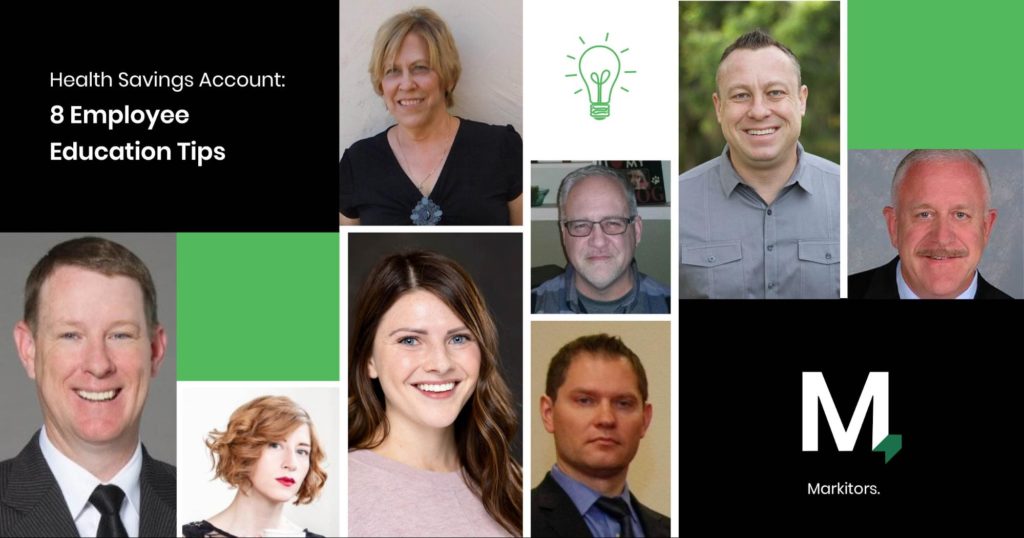Health Savings Accounts (HSAs) are often a foreign concept when employers offer them to employees. What should employees know – or ask – about a Health Savings Account offered as a part of an employer’s benefit plan?
To create this article, we posed that question to employers, employees, and financial services professionals. The focus here is on the United States: An HSA is a type of medical savings account available to taxpayers strictly in the United States who are enrolled in high-deductible medical insurance plans.
Here are eight employee education tips for health savings accounts:
- Understand Your Options
- Analyze your Past Records
- Focus on Interest Rates and Penalties
- Understand Your Health Care Needs
- Research Specialized Service Coverage
- HSAs Aren’t For Everyone
- Tax Advantages
- Other Health Insurance Are Not Allowed Under an HSA
Let’s dive deeper into each education tip offered by employers and financial service professionals.
Understand your options
The first thing to do is understand what a health savings account is. Do your research until you know your options and then understand your options. The golden key here is knowledge. You should never make major decisions without fully understanding what it is you are dealing with. — Ken Chipman, Arrow Lift
Analyze your past records
You should know that Health Savings Accounts aren’t for everyone. Gather all your records and decide if it is something you need rather than something you want to get just because it is being offered. Understanding benefit plans is tricky, but take the time to look through everything. Don’t just go with what everyone else is doing. — Peter L. Babinski, Stomadent Dental Lab
Focus on Interest Rates and Penalties
Employees should focus on things like interest rate, if the money is pre-taxed and if there is a penalty for early withdrawal. Interest rates often get overlooked, but over time they make a huge difference in the amount of money that is accumulated. Employees should also be aware of the taxing process as well as their options should they need to withdraw the money early. — Ryan Nouis, TruPath
Understand your Health Care needs
Like any health care option, a Health Savings Account has its pros and cons. Evaluate your healthcare needs and your budget for the next year. Someone young and healthy will most likely view an HSA as an attractive choice. Someone not as healthy with expensive medical care needs might forego the HSA option. It’s all about doing what’s best for you and your situation and taking advantage of the benefits an HSA has to offer you. — Kayla Centeno, Markitors
Research specialized Service Coverage
Many employees want to know if they can use their health savings account (HSA) to pay for dental implants. The answer is that in most cases, dentures are eligible for reimbursement with an HSA plan. Dentures may also be eligible for reimbursements through a flexible spending account (FSA), a health reimbursement arrangement (HRA) and a limited care flexible spending account (LCFSA). The plan where dentures are often not eligible for reimbursement is a dependent care flexible spending account (DCFSA). When in doubt, always check with your insurance carrier to get a more personalized answer. — Henry Babichenko, DD, European Denture Center
They aren’t for everyone
These accounts don’t make sense for everyone, but are really great for individuals and families with predicted medical expenses above their deductibles. If you know that you will outspend your deductible this year, then I highly recommend an HSA. — Anna Caldwell, Accredited Debt Relief
Tax advantages
Young and healthy employees should really look into the triple-tax-advantage of HSAs as a long-term financial planning vehicle.
Second to a 401k match, HSA money (especially if there is an employer funded portion) is one of the best ways to set aside money for the future. The dollar amount of the employee contribution (both the high-deductible insurance premium plus the tax-deferred saved portion will look daunting at first, especially when compared to a traditional health care plan, but most of that money, if not used, will build, accrue and grow until it is needed for medical expenses or until post-retirement when it can be freely used. It can be a powerful tool, under the right circumstances. — Matthew Lee, Learning & Development Leader
Other Health Insurance not Allowed under an HSA
HSA’s are composed of two key elements. The two elements are a High Deductible Health Insurance Plan (HDHP) and a Tax Deductible Health Savings Account (HSA). The premiums are lower, contributions are tax-deductible and withdrawals for medical expenses are tax free. However, you need to be aware no other health insurance is allowed unless you meet an exception. — Joanne M Elsen, CPA PC


